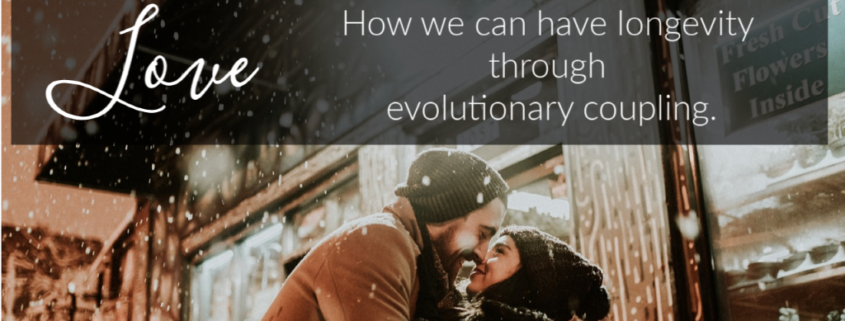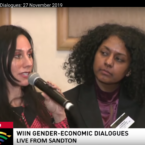Love: How We Can Have Longevity Through Evolutionary Coupling
I picked my friend up from the airport. He’d flown in to comfort me after my divorce. On the drive back to my house, I bitched to him about the shitty dates I’d had since being newly single. As always, he listened and offered his empathy in a gracious way.
We’d been friends for nearly two years, strictly platonic. Our connection was very honest, real, and held back no punches when need be. So it came to my immense surprise when we shared our first kiss later that same day of his arrival.
It wasn’t only a kiss. It was the cosmos opening up and infusing both of us with profound awe and deep awareness. However, it would still be a few weeks before we fully surrendered to the fact that we had truly met our match.
That was ten years ago.
We’ve had a huge journey. Many ups and downs and all-arounds. Yet what remains very true is that we cherish our evolutionary relationship, one where our love isn’t only devotional towards one another, but equally offered up as a devotion to love itself.
I share my story here because there are few living examples of what evolutionary love looks like—one where we feel seen intellectually, emotionally, spiritually, and sexually. It is from this place of embodied experience that I wish to share my stance on love.
Love is a calling.
To desire intimate relationship is a profound yearning for many of us. It’s one that can feel deeply vulnerable to admit to, whether we are single or partnered.
The call to love cannot be ignored. For some, it can actually be an obsession. I have many friends who, in their pursuit of this desire, feel thread-bare and wrung-out. et they still prevail, because the calling is stronger than the disappointment.
Love will ask everything of us.
When love does come, at first it plays a little trick on us. We are infused with PEA—the in-love hormone—and see life and our new partner with rose-colored glasses. It’s similar to how nature creates uber-cute babies as a preventative measure against the massive stress that new parents will face. We can only see the beauty in our partner in this phase, yet fairly quickly in, we must face the initiatory gate of love: all that is within us will need to be loved into wholeness, lest it interferes with the relationship.
This doesn’t mean that we need to be all sorted. In fact, I doubt we ever get to a place of ‘being sorted’. Instead, we have the opportunity to turn some of our awareness inwardly to address all the parts of us that yearn to be loved. It’s as though those unloved parts say: Oh good, love is in the house; maybe now we have a chance to be integrated.
We yearn for love, and we fear love. We know it’s the best thing ever and the most terrifying. Because of love, we can no longer hide in our patterns and habits. We must evolve.
This is why ‘normal’ relationships don’t work. We believe that our partner will change (into the potential we sense within them), and they don’t, while they believe that we will never change, and we do.
To love is to respect.
The word ‘love’ is confusing, since there seem to be a million and one ways to interpret it. So I prefer to use the word ‘respect’. If we say we love someone but don’t respect them, then we do not love them. We may have affection for them, but it’s not love. The same holds true towards ourselves. To love is to respect.
This is where ‘evolutionary’ relationship comes in. It’s the truth of the connection now, as well as the truth of the evolution of both individuals and their relationship. To evolve with another requires, at its foundation, respect. Without it, there’s no tenacity.
Love can be hijacked.
Love is one of the predominant inquiries of most of the women who train with me, and through hearing thousands of stories and questions about love, it has become clear to me that the pure impulse for love is often hijacked by social mandates and ideals about love.
It’s not uncommon for women to have long bullet-point lists about their perfect partner—an ideal that no human could live up to. Yet it’s not as common to understand the gifts we are bringing to a relationship, as well as what is and isn’t negotiable for us.
Most of us have learned about love by the way our parents loved each other. Let’s call that our first imprint of love. More often than not, we will choose the kind of love that resembles or is in complete opposition to what we learned. It isn’t until we separate out all the ideals and ideas of others on the topic of love that we will come face-to-face with what love truly means for us.
When we do this, we start to be more confident in our ability to create and participate in an evolutionary relationship. And when we love like this, not only do we change for the better, but our love also serves both those closest to us and our communities.
If love is in your heart, and you desire to create an evolutionary relationship, you’re invited to join my Song of Love – Creating An Evolutionary Relationship training. Click HERE to find out more! Because love is so individual, it would be fantastic to read your thoughts on the topic in the comment section below.



My dear you write beautifully!! I do am impressed.
And I am touched by the content.
And I am touched by the fact that you present yourself as a woman, a whole being, not as a happy coupled woman. 🙂
Thank you.
How can I get the recording of the webinar you mentioned?
Thanks again. 😉 🙂
Hi Silvia, that webinar is now a recording. You can reach out to my team: care@saidadesilets.com and have Maya help you with your request. Wonderful to meet you!
I love your line about us wanting our partners to change and them wanting us not to change. After 55 years with my beloved partner we really do have an evolutionary relationship. It’s a cliche, but that evolution is runs on the trust built as we have navigated the ups and downs of our life together. For long moments now we can enter a place where both our defenses are down and are able to talk about the differences between us as normal things. It is so much fun. I think what you called respect is what I am calling trust. Thanks for your continued sharing. Barb Hutsell
Amazing! Thank you so much for sharing about your love!! WOW!!!
Hi Saida
Thank you for this story. I love the way you write about intimacy.
This piece has triggered something for me that has made me realise that during our many hours of sex during which we are both are multi orgasmic it seems that there are many moments that are offered in prayerful love to the universe. So, Sex is my prayer, just as washing the floor may be a prayer. This may sound odd yet it is the way I have lived my 80 year life. I have only just now (thanks to you) fully realised and included our orgasmic energy as prayerful love to the universe. With love and Sunshine from Morgan in Australia.
WOW! Morgan, amazing. Thank you for sharing.
Saida – the best story I recall is about a little boy who rescued a bird with a broken wing. He took it home, put it in a cage and nursed it until it was healthy again. His father then said he had to let it go. “If it comes back to you, it’s yours to keep; if it doesn’t, it was never yours in the first place.” I believe that’s what love truly is: wanting true freedom for the other regardless of the loss it may bring to yourself.
Wow Stephen! I love this!